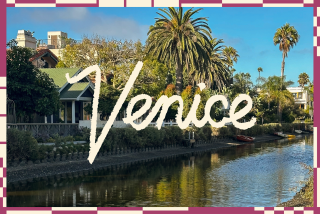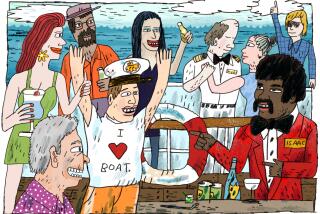Their brotherly spat takes a holiday
- Share via
It’s not often that one receives tickets for a luxurious, all-expenses-paid European cruise out of the blue. But that’s what happened to me and my brother, Andrian.
Our benefactor was Great-Aunt Norma.
When she was young, she didn’t have the money for such an adventure, she told us. When she was older, she didn’t have the time. Now, in old age, she had both, but her health was lacking.
The ship, the Radisson Seven Seas Navigator, and its itinerary were a dream: embarking in Venice, Italy, and sailing to Split, Croatia; Malta; Sardinia; Livorno, Italy; Marseilles and Sète, France; Palma de Mallorca; and disembarking in Barcelona, Spain.
In exchange for the cruise, Aunt Norma extracted two promises from us: We had to take a lot of photographs to share with her, and Andrian and I had to spend every possible moment together. Aunt Norma had a hidden agenda.
Andrian and I had a strained relationship, and we tended to blow up over inconsequential matters. In fact, we hadn’t spoken since an argument at Christmas five years before.
Because Andrian then lived in New York City and I in Los Angeles, we flew separately to Venice.
I arrived the day before he did, and it was already evening when I entered a Venice tourist office, cold, haggard and hungry after 18 hours of travel. My first night in Venice was on my dime, so I requested help finding budget accommodations, and booked a $47 room at a clean rooming house that appeared to have been recently renovated. My room had a view of a canal and included a continental breakfast of pastries served sealed in plastic wrappers.
The next morning, I returned to the tourist office and asked the same clerk for directions to the Hotel Cipriani, where Andrian and I would stay before the cruise. Her eyebrows arched with surprise; the expensive Cipriani consistently lands on annual lists of the world’s top 20 hotels.
The night was on Aunt Norma: She had read about the Cipriani and its glories and had insisted we stay there.
Who was I to quibble? I took the No. 8 water taxi to Giudecca Island and checked in. The Cipriani exudes a confident, understated elegance. A bellboy and a butler showed me to the room, which was in a 15th century palazzo linked by a beautiful courtyard to the main hotel building.
To describe the place as a “room” is irreverent: Its floor was 900 square feet of marble and supported a fine assortment of antique furniture. The large bathroom was all red marble, including a sarcophagus-like bathtub with built-in jets. From the room, you could see the Giudecca Canal and a postcard view of the Venetian skyline: the Basilica di Santa Maria della Salute and the renowned structures of the Piazza San Marco and, in the background, other landmarks silhouetted in a misty sky.
*
A perfect Venice noir
A few hours later, Andrian arrived. Fresh from a bath and wrapped in a plush hotel robe, I greeted him. We exchanged cursory hellos, and as I poured him a glass of champagne and showed him around the palazzo, he complained about flight delays and post-Sept. 11 travel hassles.Then he stopped mid-sentence, taking in our exquisite surroundings.
I suggested (with a straight face) that as difficult as things were, we’d have to make the best of it.
A reluctant smile materialized on Andrian’s face.
By any measure of reality, our circumstances should have engendered some spark of esprit de corps. But, as we discussed our sightseeing plans over dinner at Cip’s Club, a cozy hotel restaurant, it was clear this was not going to happen.
At the top of his list was the Jewish Ghetto. I wanted to visit the Peggy Guggenheim Collection, the modern art museum that was her home for 30 years. There was enough time to see both, which we did, but that was beside the point. You say potato .
In November, Venice may lack the balmy, terra-cotta glow of summer, but it is hardly bleak. The city assumes, at times, a noirish complexion; clouds roll through, then the skies clear up to bathe in sunshine and shadow some work of art, which means just about any bridge, monument or building you happen to see.
As Andrian and I walked along, our animosity seemed to dissipate as our focus deflected from each other and onto our magical surroundings. That is until, per Aunt Norma’s directive, we took photographs of each other. It was a pictorial of forced smiles.
As we checked out of the Cipriani, I accidentally saw the bill that had been covered by Aunt Norma’s credit card: Our one night cost $1,200. It seemed something of a waste, frankly, to fund such an expensive trip when there was little chance of mutual enjoyment. Had Aunt Norma concocted a literal guilt trip?
Andrian and I were relieved when it was time to board the Navigator. Cruising is a relatively stress-free way to see the world. Issues such as packing and unpacking, finding adequate lodging and restaurants, and making it to the train on time are not factors.
Cruising, then, should have made finding things to bicker about more difficult. Which, I guess, was Aunt Norma’s theory.
But how we tested it.
At Split, on the Dalmatian coast, Andrian and I disembarked in sunshine. Within an hour, a downpour had us running for cover. I don’t believe it is anybody’s responsibility to carry an umbrella, but it was a point worth 15 minutes of recriminations.
I insisted on trying a local place for lunch, so we crept under building ledges until we found a cafeteria that catered to college students. We got plates of pork, cooked cabbage and rice for about $2.50 each, and chewed our way through the greasy, tasteless meals in a room choking with cigarette smoke.
“Hey,” I told Andrian, “for $2.50, what do you expect?”
Andrian’s rebuke drowned the chatter of Croats. “Two fifty? Two fifty?” he screamed. “I could be eating lobster bisque and grilled mahi mahi on the ship — for free!”
A short while later, the sun broke through and we wandered — mostly peacefully — around Diocletian’s Palace, built by Roman Emperor Gaius Aurelius Valerius Diocletianus at the end of the 3rd century. Its huge walls now enclose a small city filled with shops and cafes.
There is something to be said for coming back to the familiar after spending a day exploring a foreign place. On the Navigator, Aunt Norma’s largesse bought us a small suite with a private balcony, complete with deck chairs. There were comfortable beds topped with down comforters; the bathroom had a full-sized tub and a separate shower.
We shook off our chill in the ship’s sauna, then dressed for dinner. We were able to joke about our adventure over a five-course meal in the ship’s sumptuous dining room and watch the twinkling lights on the Mediterranean coast glide past.
Our good cheer was no doubt fueled by the copious amounts of fine wines the sommelier suggested. How could we not enjoy this?
In Malta, Andrian and I agreed to spend the day wandering around Valletta, the capital, built by the Knights of Malta atop cliffs between two harbors. Valletta has a timeless, arid feel, and a golden hue from the streets and buildings, which are constructed from the sandstone that forms the islands.
We decided to visit the Upper Barrakka Gardens, and it was a bit of a hike to the top. That alone should have provided ample fodder for a row. Instead, we found a quiet place to sit amid exotic flora and plaques honoring people involved in the island’s rich history and absorb the spectacular views of the harbors and the city.
By now, it was obvious that we enjoyed each other’s company. We had come to a place, both figuratively and literally, where our differences seemed petty. And we agreed to leave the past the past and open a new chapter.
The rest of the trip was smooth sailing in all senses.
In Barcelona, after we had disembarked, I woke at 4 a.m. to make it to the airport in time for my flight. As I quietly left the hotel room, Andrian raised his head off his pillow.
“We ought to do this again sometime,” he said.
Back home, I shared the photographs of our trip with Aunt Norma, who was curious to find out how Andrian and I had gotten along. As she flipped through the last of the photographs, she seemed to understand that the smiles we had captured in the second part of the trip, from Malta to Barcelona, told the real story.
More to Read
Sign up for The Wild
We’ll help you find the best places to hike, bike and run, as well as the perfect silent spots for meditation and yoga.
You may occasionally receive promotional content from the Los Angeles Times.






